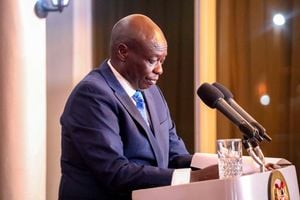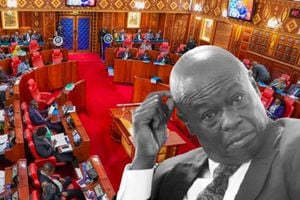Depriving learners of quality sleep time hurts teaching and learning

Alliance Girls High School students celebrate Valentine’s day at their school on 14th February 2024.
Former principal of Alliance Girls’ High School Dorothy Kamwilu banned early morning preps at the school, a few days after settling down as the head.
She said this during a brainstorming session on cheating in national examinations when then Cabinet Secretary for Education, Dr Fred Matiang’i, held a caucus of the principals of national Schools at a hotel in Nairobi in 2016. The session was among many others the ministry held to restore the credibility and integrity in the administration of national examinations—at the backdrop of audacious cheating in examinations in 2015.
Ms Kamwilu said she noticed, when she was newly posted at the school, that students looked tired, and dozy during the morning sessions when they should be alert at the break of the day’s programmes. She connected the fatigue and drowsiness to shortened sleeping time the students then had. “The students used to be in class by 5am for the morning preps and under the weekly supervision of two teachers,” I recall the principal as saying, adding that they needed to wake up much earlier to be in class by 5am.
She said the ban on the 5am preps meant that the students started having sufficient sleep, waking up at 6am, preparing themselves, and being in classes to prepare for the day’s tuition. Fellow principals proffered other reasons for cheating in national examinations. However, I found sleep deprivation as a factor in education not only interesting.
“What is the correlation between waking up early to ensure learners are in class by 5am and cheating in the examinations,” I asked the former principal when I had the opportunity to interact with her, immediately upon her deployment to the Education ministry at Jogoo House early last year.
She explained that when you force children to be in class by 5am, they have to wake an hour or so earlier. It means they wake up when they have not had sufficient sleep. “And so, they simply doze off in the classroom that early hour, not able to study as expected,” she said.
The most unsettling aspect of this regime, she noted, is that learners don’t concentrate during the official teaching hours—between 8am and 3.30pm—the official instructional hours the Education ministry designates in the Basic Education Regulations, 2015. When you cut sleeping time for children, you affect them the entire day. There is little or no quality learning the students ever have at their disposal throughout the time.
Without concentration and without the attention this requires, the absorption capacity of learners is predictably low. Ms Kamwilu says that effective learning happens when children are relaxed and wide awake. Without the fatigue occasioned by shortened sleeping hours.
The former principal opines that the instructional time the ministry has prescribed for basic education and the space the school provides throughout its calendar is more than enough to understand the syllabus. The need for sufficient sleep is not whimsical. Sleep is essential for the mental well-being of a human being, more so a student. It improves their ability to focus, concentrate, and perform. The same principle applies to all occupations or tasks.
Mr Buhere is a communications officer at the Ministry of Education ([email protected]).





